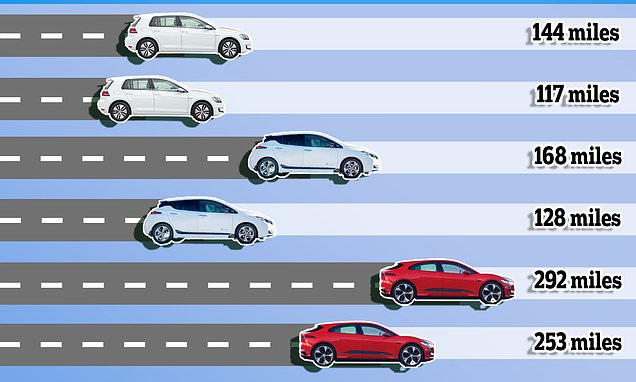Electric cars have been gaining immense popularity in recent years, and for good reason. They are environmentally friendly, cost-effective, and offer a smooth, quiet ride. However, one burning question that often comes to mind when considering an electric car is, “How many miles can you go on an electric car?” In this article, we’ll dive deep into this fascinating topic and explore the range capabilities of electric vehicles.
How Many Miles Can You Go On An Electric Car?
The range of an electric car, or how many miles it can travel on a single charge, is a crucial factor when deciding to go electric. It’s a common concern for prospective buyers, but the answer is not as straightforward as one might think. The range of an electric car can vary significantly depending on several factors, including the model of the car, the battery’s capacity, driving conditions, and even the weather.
Factors Affecting Range
1. Battery Capacity: The primary factor that determines how many miles you can go on an electric car is the battery’s capacity. Electric cars come with different battery sizes, typically measured in kilowatt-hours (kWh). The higher the kWh, the more energy the battery can store, which translates to a longer range. For example, a car with a 60 kWh battery will generally have a longer range than a car with a 40 kWh battery.
2. Model and Make: Different electric car models have varying efficiencies and powertrains. Some are designed for maximum range, while others prioritize performance. Luxury models might have larger batteries and longer ranges compared to more affordable options.
3. Driving Conditions: Your driving habits and the conditions you drive in play a significant role in how far you can go on a single charge. Highway driving, for instance, tends to consume more energy than city driving due to higher speeds. Hilly terrain and stop-and-go traffic can also affect your range.
4. Weather: Weather conditions, particularly extreme cold or hot temperatures, can impact your electric car’s range. Extremely cold weather can reduce the efficiency of the battery, leading to shorter ranges. Preconditioning your car while it’s still plugged in can help mitigate this issue.
5. Speed: The speed at which you drive can impact your range. Higher speeds typically require more energy, which can result in a shorter range. To maximize your electric car’s range, consider driving at a steady, moderate speed.
Estimating Range
To get a better idea of how many miles you can go on an electric car, manufacturers often provide an estimate. These estimates are typically given in miles per charge (e.g., 250 miles per charge). However, it’s essential to remember that these numbers are approximate and can vary based on the factors mentioned above.
Additionally, some electric cars come equipped with features and technology that help you gauge your range more accurately. These features consider factors like your current driving habits and conditions to provide real-time range estimates.
Maximizing Your Electric Car’s Range
If you want to get the most out of your electric car’s range, there are several strategies you can employ:
- Efficient Driving: Adopting efficient driving habits, like gradual acceleration and coasting, can help extend your range.
- Optimize Climate Control: Using the climate control system sparingly can conserve energy. Preconditioning your car while it’s still charging is a smart move.
- Plan Your Routes: Utilize route-planning apps or your car’s built-in navigation system to choose routes with charging stations along the way. This way, you can avoid range anxiety.
- Regular Maintenance: Keeping your electric car well-maintained, including tire pressure checks and brake maintenance, can improve efficiency and extend your range.
Range Comparison
To provide a better understanding of the range capabilities of electric cars, here are some examples of popular electric models:
- Tesla Model 3: The Tesla Model 3 has a range of around 250 to 358 miles, depending on the battery configuration. It’s known for its impressive range capabilities and is often used as a benchmark for other electric cars.
- Nissan Leaf: The Nissan Leaf offers a range of approximately 150 to 226 miles. It’s a more affordable option for those looking to go electric.
- Chevrolet Bolt EV: The Chevrolet Bolt EV provides a range of about 259 miles, making it a competitive choice in the electric vehicle market.
- Ford Mustang Mach-E: The Ford Mustang Mach-E offers a range of approximately 211 to 305 miles, making it a compelling option for those who want both style and range.
- Hyundai Kona Electric: The Hyundai Kona Electric provides a range of around 258 miles, making it a well-rounded choice in the electric SUV category.
The Future of Electric Car Range
As technology continues to advance, we can expect even greater improvements in electric car range. Battery technology is evolving rapidly, with companies working on higher-capacity batteries that will extend the range of electric cars. Additionally, the expansion of charging infrastructure will reduce range anxiety and make electric cars more accessible.
In conclusion, when it comes to the question, “How many miles can you go on an electric car?” the answer varies depending on a range of factors, including battery capacity, model, driving conditions, weather, and driving habits. By understanding these factors and employing efficient driving practices, you can maximize your electric car’s range and make the most of this exciting, sustainable mode of transportation. With ongoing advancements in electric vehicle technology, the future looks bright for electric car range, making them an increasingly attractive choice for environmentally conscious consumers.
